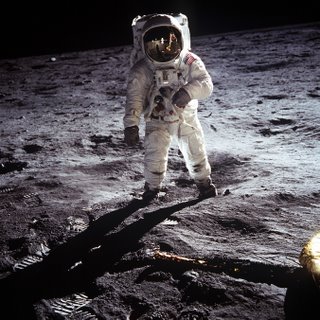
I should have blogged yesterday, but I needed to check a formula which I wish to put here, which I will do in the next week (I hope). I will just talking here today about some random things.
First, today is the 37th anniversary of the first visit of men to another celestial body. Of course I'm talking about the moon, as we didn't manage to visit (at least personally) any other, which I hope to happen still in my lifespan. Indeed, i would like to do it one day (I know, I'm dreaming too much...). You can have more details in the Wikipedia article: Apollo 11.
Another thing is that I found an interesting paper in the arXiv yesterday:
Physical limits on information processing
Stephen D. H. Hsu
hep-th/0607082
It is about bounds on the velocity of information processes in nature. This article is one of many I've been following in the last years which shows a trend to study information as a physical quantity. I'd like to call it Information Physics, or maybe, to be a little more modern, iPhysics.
Anyway, I sent an email to Stephen asking about the definition of information process. He was kind enough to answer me very fast and I will reproduce it here as it may be interesting:
Stephen also pointed me to his blog "Information Processing", which is very interesting and I'm adding to my list in the lateral column.
Picture: Astronaut Buzz Aldrin on the moon, from NASA.
First, today is the 37th anniversary of the first visit of men to another celestial body. Of course I'm talking about the moon, as we didn't manage to visit (at least personally) any other, which I hope to happen still in my lifespan. Indeed, i would like to do it one day (I know, I'm dreaming too much...). You can have more details in the Wikipedia article: Apollo 11.
Another thing is that I found an interesting paper in the arXiv yesterday:
Physical limits on information processing
Stephen D. H. Hsu
hep-th/0607082
It is about bounds on the velocity of information processes in nature. This article is one of many I've been following in the last years which shows a trend to study information as a physical quantity. I'd like to call it Information Physics, or maybe, to be a little more modern, iPhysics.
Anyway, I sent an email to Stephen asking about the definition of information process. He was kind enough to answer me very fast and I will reproduce it here as it may be interesting:
Hi Roberto,
I'm using the Margolus-Levitin (ML) definition, which is evolution
from some initial state i to some orthogonal final state f (e.g.,
| f > = 0 ).That is defined as a single operation.
In classical computation this seems quite reasonable, as "flipping a
bit" presumably means moving some part of the system from, e.g., one
energy eigenstate to another, which would mean a transition between
two orthogonal states.
For quantum computation it is not so clear how to define a discrete
unit of computation. However, I think what ML chose is very
reasonable. If you haven't evolved the system into a different
orthogonal state, it isn't really distinguishable from the initial
state as it still has some overlap with the initial state.
Hope that makes sense.
Cheers,
Steve
Stephen also pointed me to his blog "Information Processing", which is very interesting and I'm adding to my list in the lateral column.
Picture: Astronaut Buzz Aldrin on the moon, from NASA.

No comments:
Post a Comment